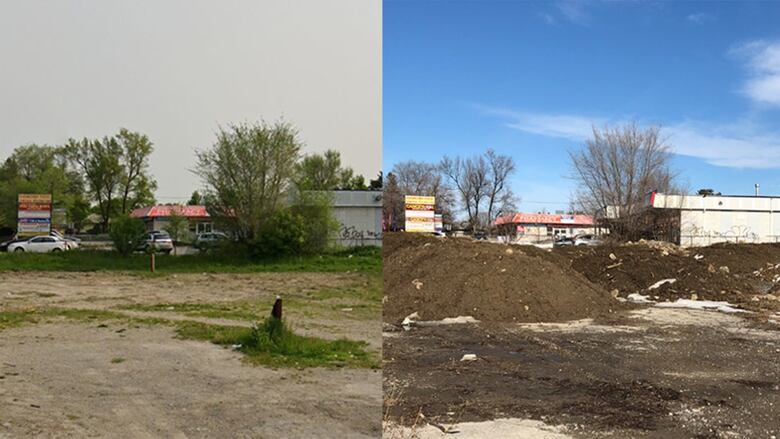Property owners, taxpayers on hook for cleanup as illegal dumpers target east end
City having trouble keeping up with the problem, officials say

Hundreds of dump-truck loads of dirt, garbage and construction waste are piling up in Scarborough neighbourhoods, costing property owners and taxpayers a lot of money to clean up, but the city says it's having trouble keeping up with the illegal practice.
Dump-truck drivers are ditching the loads on private properties, city streets and parking lots.
"It's not a victimless crime, that's for sure," Dave Youngs told CBC News.
Youngs, who runs an excavation business, says it cost him $20,000 to clean up dozens of loads of illegally dumped soil and debris on a property he owns.
He says he also called 911 to report a steady stream of dump trucks illegally unloading construction waste on another property, but was told to call Toronto's 311 help line instead.
He says he never heard back from the city.
"There's no teeth. There's nothing to nail these guys. They found a gray area in the law between the police doing their job, and bylaw enforcing the law. And the guy who bears the brunt of the shortfall is the owner of the property," he said.
Joe Magalhaes, a district manager at the city's Municipal Licensing and Standards department, says Youngs's concerns aren't isolated.
"Yes, each year across the city we get thousands of complaints," he told CBC News.
On city streets, laneways and parks, the taxpayer picks up the tab to clean up the illegal dumping.
On private property, it's the land owner.

Old Knob Hill Hotel site hit
On a recent tour of Scarborough, Youngs showed CBC News a dozen parking lots, vacant properties and even a city street where dump truck drivers had piled loads of soil and construction waste.
On the old Knob Hill Hotel site at Eglinton Avenue East and Danforth Road, there appeared to be more than 100 loads of illegally dumped debris.
"Sixty to 70 thousand dollars to clean it, at least," Youngs estimated, noting the land owner will need to separate any debris from the soil before it can be hauled away.
Mattamy Homes owns the property, which is currently awaiting redevelopment.
"Mattamy is aware of the ongoing and illegal dumping at our Eglinton Avenue property and we are looking to take additional steps to secure our site," Brent Carey, Mattamy's vice president of communications, told CBC News in a statement.
Mattamy says the site was also hit by illegal dumpers last year.

Just up the street, a former gas station at Danforth Road and Saravin Street has had more than 30 truckloads of waste that appear to have been dumped illegally.
Buried among the piles of dirt are old sewer pipes, and cinder blocks.
"That's the foundation of a house, and no way could you dump that in a [licensed] fill site" Youngs said.
A few blocks away at an upcoming townhouse development on Galloway Road, it appears truckers pushed through a fence and buried almost the entire lot with dirt and what appeared to be construction debris.
And at the foot of Mason Road, it appears about 100 truckloads of soil and debris have been dumped next to a series of townhouses where people live.
Big money in illegal dumping
While the costs are high for land owners who are victimized, it's a lucrative business for illegal dumpers.
On average, it costs about $330 to remove a single load of dirt from a construction site.
The fill has to be trucked to licensed dumps an hour north or east of Toronto. Not only is it time consuming, dumping or tipping fees cost at least $100 per load.
Debris has to be removed from the soil. And soil, contaminated with oil or heavy metals has to be taken to another facility for remediation.
Illegal dumping — or dirt "schwabing" as it's called — is a fast, easy way to make much more money.
"When I can dump dirt illegally in Scarborough, in someone's parking lot, I'm not paying the tipping fee," said Youngs.
"And if I'm hauling at $330 a load, I'm still getting the $330, but I'm doing three loads an hour instead of four or five loads a day. So, I'm just jamming the money in my pocket," he added.
Youngs says illegal dumpers often work in tandem, using a lookout to scope out locations and keep an eye out for bylaw officers.
The lookout signals the truckers when it's safe to dump. They arrive one after another, each able to dump a full load of dirt and debris in just minutes, he added.
"It happens in broad daylight, and it's going on all day," he told CBC News.

218 charges since 2018
Magalhaes concedes prosecuting illegal dumpers doesn't happen often.
"When we can identify that person we do charge that individual or entity for dumping. They're few and far between, those occasions," he told CBC News.
In the past two years, the city has issued 218 citations for illegal dumping construction fill.
Developers and owners of vacant lots are taking additional steps to protect their properties by placing large concrete blocks and steel fences to block illegal dumpers.